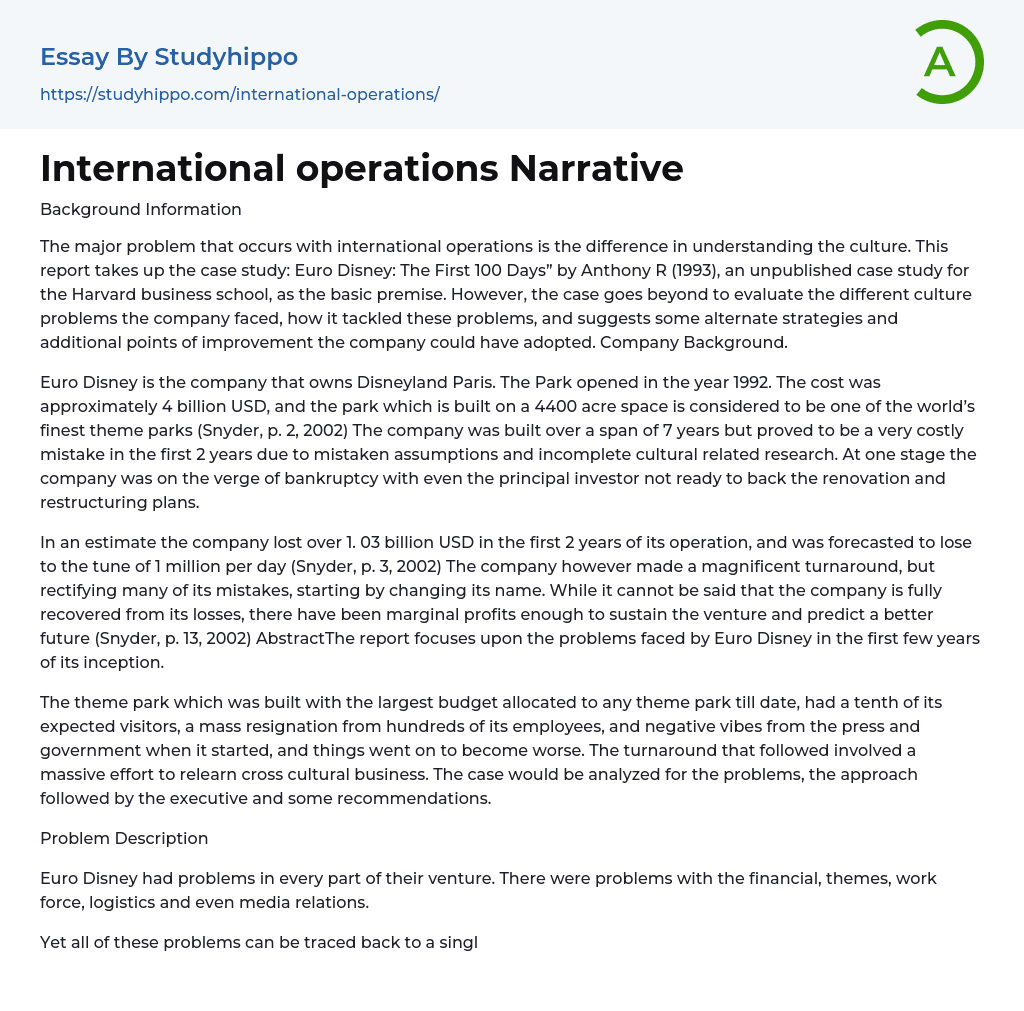Background Information
The main issue with international operations is the cultural differences. This report examines the case study titled "Euro Disney: The First 100 Days" by Anthony R (1993), an unpublished case study for Harvard Business School. It not only analyzes the cultural challenges faced by the company but also discusses how it dealt with these challenges and proposes alternative strategies and areas for improvement that the company could have considered. Company Background.
Euro Disney is the owner of Disneyland Paris, which opened in 1992. The park cost approximately 4 billion USD and is located on a 4400 acre space, making it one of the world's top theme parks (Snyder, p. 2, 2002). Despite being built over a span of 7 years, the company faced significant financial difficulties in its first 2 years due to incorrect assumptions
...and inadequate cultural research. At one point, the company was on the brink of bankruptcy, with even the primary investor hesitant to support renovation and restructuring plans. It is estimated that the company incurred losses of over 1 billion USD.
The company incurred a loss of $3 billion in the first 2 years of operation and was predicted to lose $1 million per day (Snyder, p. 3, 2002). However, by rectifying its mistakes and changing its name, the company managed to make a remarkable turnaround. Although it is not fully recovered from its losses, the venture has experienced marginal profits that provide hope for a better future (Snyder, p. 13, 2002).
The report focuses on the challenges faced by Euro Disney during its initial years. Despite having the largest budget ever allocated to a theme park, Euro Disney only attracted a tenth
of its projected visitors. Additionally, there was a significant staff resignation and negative public and governmental perception during its launch, leading to further difficulties. To overcome these challenges, a massive effort was made to learn about cross-cultural business practices.
The text will analyze the case, including the problems, the approach taken by the executive, and some recommendations.
Problem Description
Euro Disney faced challenges in multiple areas of their venture. These issues encompassed finances, themes, workforce, logistics, and media relations. However, all these problems can be traced back to a single crucial factor – a lack of awareness regarding cultural barriers. When Disney inaugurated the park, they relied on their prior experience in other nations, especially Japan.
The Disney management witnessed the great success of the theme park in Japan and became convinced of the potential of theme parks in international locations. Although Japan, being a conservative eastern country, embraced the theme park concept, the management decided to open a park in Europe, believing it to be culturally closer to the United States. However, they overlooked the important step of researching cultural differences and their potential impact on the company's strategy.
This case study explores the challenges that can arise when assuming two seemingly similar cultures have comparable ways of thinking and behaving without adequately assessing public opinion. The analysis focuses on the organization's human resources, which proved to be a significant obstacle upon entering the country. Disney, an American company, acknowledged the similarity in ethnicity between their home country and the new market. However, they failed to acknowledge the disparities between the people of both countries, particularly regarding their mindset and socio-economic conditions. There are vast differences in social and
economic expectations among individuals. Cross-cultural human resource management greatly impacts multinational companies' operations as these companies strive to ensure employee satisfaction and happiness (Harvard Business School, 1993).
Efforts to ensure efficient results need to be channeled in the right direction. Although Euro Disney management made many efforts, the solutions came after the problems had already occurred. Therefore, the main problem lies in the improper analysis of the problem, specifically the effect of improper analysis of culture on starting ventures in new countries (Grant, n.d.).
It was discovered that within the initial nine-week period of operation, approximately 1000 employees, more than half of whom left voluntarily, resigned from the company. The company was unprepared for this situation as they had not thoroughly familiarized themselves with French labor laws. These laws allow for easy termination of employees for up to two years (Harvard Business School, 1993).
- Activism essays
- Communism essays
- Conservatism essays
- Liberalism essays
- Marxism essays
- Nationalism essays
- Patriotism essays
- Policy essays
- Public Policy essays
- Social Contract essays
- Socialism essays
- Totalitarianism essays
- Bernie Madoff essays
- Bill Gates essays
- Henry Ford essays
- Rockefeller essays
- Steve Jobs essays
- Walt Disney essays




